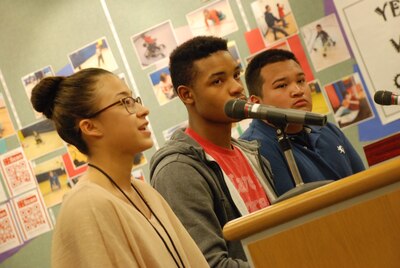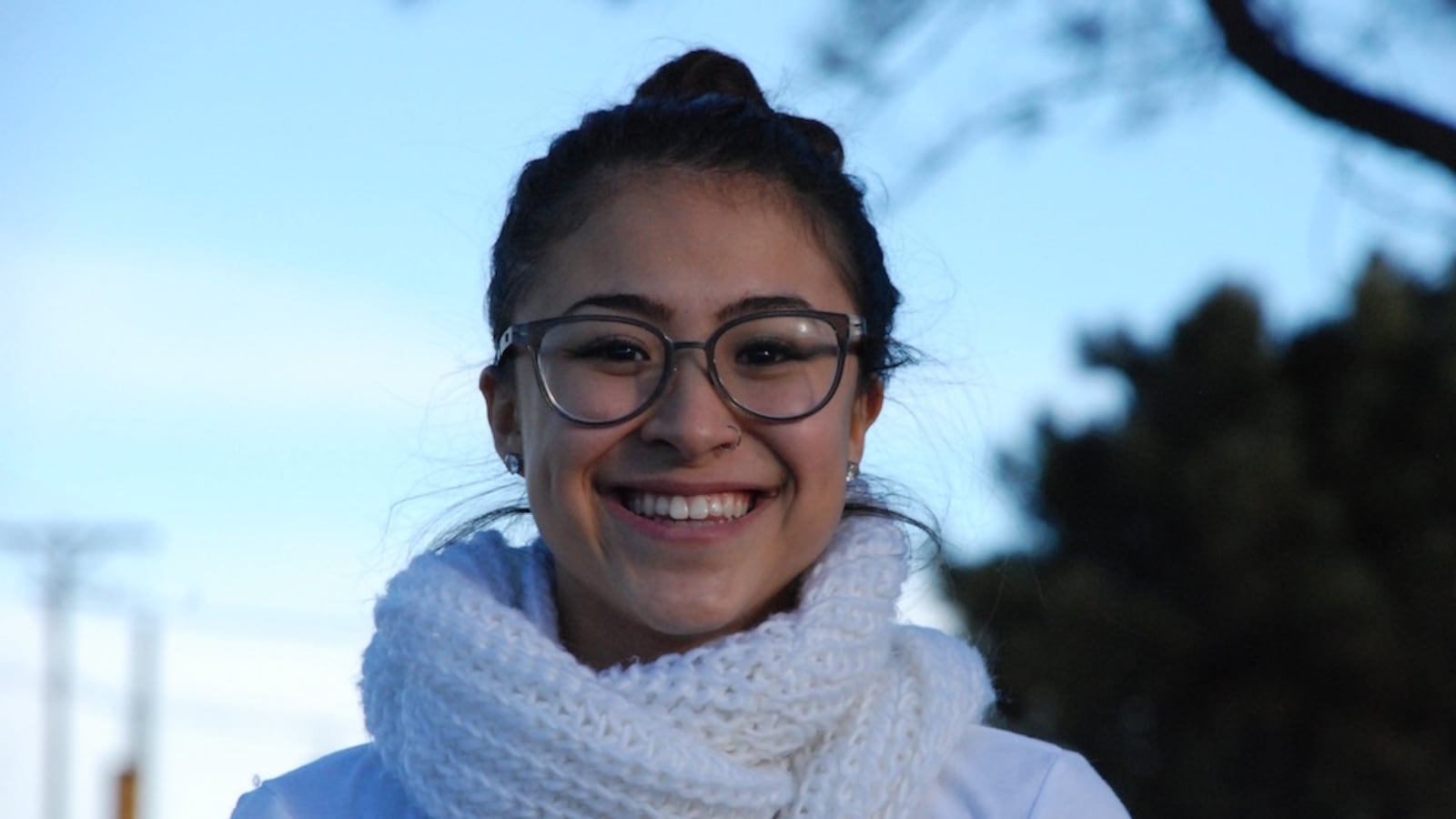Yamel Ramirez has beaten the odds.
The daughter of an immigrant, Ramirez grew up poor, bounced between different neighborhoods and schools, and at one point was homeless.
Finally settled in the Original Aurora neighborhood, she graduated on time from Aurora Central High School, a school labeled as failing by the state for five years. And she just finished her first semester at Colorado State University-Pueblo with a 3.6 grade point average.
“I’m trying to give myself a life I think I deserve,” she said recently while on break between the fall and spring semesters.
Last year, Ramirez was a strong advocate for Aurora Central, which is being redesigned in an effort to boost student achievement and stave off state sanctions. She and two of her classmates spoke in front of the Aurora school board about proposed changes at Central. They knew Aurora Central had a bad rap and was in need of improvement, but there were good teachers and students trying hard at the school too, they reminded the board.
During our conversation, Ramirez reflected on her last year at Aurora Central, what changes she hopes take hold at the school and the struggles of student loans.
She also took to task the apathy she said she observed among some Aurora Central students, teachers and administrators.
This interview has been edited for clarity and brevity.
For those of us too old to remember, what is it like to graduate from high school?
It’s bittersweet. Like at any high school, you build a lot of relationships with the people you study with and teachers. It is also really sad to see how many people don’t make it to graduation. That was a really outstanding and concerning number. But I was happy to have graduated from Central — I feel like I’m an example to kids at Central (that) you can go to college.
One of the things we know is that Aurora has one of the lowest graduation rate in the metro area. Fewer than 60 percent of students graduate on time. Why do you think that is?
It makes a difference that there are so many minorities living in Aurora. I really believe that it’s important not to ignore the fact that there are things going on here in Aurora and other places that have to do with how things work systemically.
But for lack of a better term, there’s a lot of B.S. There’s a lot of excuses that to me can be figured out. Like parent involvement and the fact that students aren’t using all the resources they have. It’s a lack of motivation.
I’ve gone to a lot of schools in Colorado. My freshman year I attended a charter school in Brighton. The norm was to do well. Ninety-four percent of students were on honor roll. To fit in, you had to care about your education. And I don’t see that in these kids in Aurora. Kids at an elementary school who will likely go to Central one day, they’re already saying, “I don’t like school, I don’t like school.” And they’re like 7- and 8-years-olds.
I guess I was just always taught to value an education.

What can teachers and administrators do to overcome that mentality?
I see teachers who do try. One example is Mr. (Corey) Price at Central. He goes out of his way to make sure his lectures reach students. If he sees a student is struggling with the way he teaches, he’ll find a way to make sure you get it. I feel like, on the contrary, there are teachers who just give you a worksheet and when you can’t figure it out, they just pin you as someone who isn’t going to try. Some of these kids have no idea of what they’re looking at on these worksheets. It’s not a matter of not wanting to do it, it’s that they don’t know how to.
Do you think a school system like APS can turn that cultural tide at the student level to really make it a place where learning happens?
It will take a lot of time. It’s important to recognize that. There’s been a lot of years of damage to the students, the school, the teachers. APS and Aurora Central gets a lot of crap from everyone.
I felt like there was a community at Aurora Central. But I know a lot of kids don’t feel the same way. And I feel like that is really important: To make sure everyone feels like we can do better together. It’s a domino effect, If one cool kid tries really hard at his or her studies, others will think, “Maybe I should try to get something out of this education that is being provided to me for free.”
What needs to change at Aurora Central to make it a better school?
I think that everyone needs to stop feeling bad for the students at Central. They just need to put their foot down. We get a lot of pity and sorrow. “Oh, they’re just poor kids and refugees. That’s why they’re test scores are so low.”
Free and reduced lunch had nothing to do with the grades I had.
Stop feeling sorry for the kids. Students need adults who want to see change. I don’t think it’s wanted bad enough for the kids there. Maybe it is. I could be wrong.
Do you feel Aurora Central prepared you for a four-year college?
I feel I prepared myself. I took the initiative, which a lot of students lack. The resources and the people who want to help you are there. I love Central and I will always love Central. I took from Central 19 college credit hours for free (through concurrent enrollment, a state program that allows high school students to take college level classes). A lot of students are missing these opportunities. Students need to take greater advantage of the resources provided to them. When you don’t take advantage of these resources, you only perpetuate your status.
What are your college classes like?
I love my college classes. I think the curriculum is easier to manage for myself because I learn that way. I’m a great note-taker and I love to listen. I know some people can’t learn that way. They’re more hands-on. That’s the thing, they assess those skills at the university. I took a really long survey on my thinking skills, how I learn, what I’m most comfortable learning. It was spot-on. For me, school comes naturally.
I much prefer a college classroom versus a high school classroom. Everyone knows why they’re there and what they’re paying for. You’re paying a lot of the seat you’re sitting in.
It sounds like you’ve had a pretty good transition. But I can’t imagine everything about college has been easy?
In a sense it humbles you. I earned a 3.6 GPA last semester. Out of the six classes I had, I earned five As. But I also earned a C+. And that really crushed me. I remember at one point, I just started crying. I said to myself, “This isn’t me. I don’t perform at this level.” I tried to change my study habits, I tried to see why I just wasn’t grasping the concept.
I also felt a little under-prepared in the loan aspect. I was in a program my senior year at Central that taught me about financial aid and how student loans work. But I underestimated how much I would need to borrow. I earned scholarships and grants, but I still had to take out a lot of money. And to me that is really scary. I didn’t know that if I didn’t have that money in hand, I wouldn’t be able to register for classes for the spring semester. I felt like I just started and I was being stopped. That was a really big wakeup call.
How much did you have to borrow this year?
Fifty-five hundred dollars. It’s hard. No matter how much you prepare, you never really know how much you’re about to spend on college. I think that’s why a lot of people are discouraged. Especially those of the lower class. You know APS has a lot of at-risk students. And I think that’s a factor. There’s nothing that can save you from that. You just have to accept you’re going to be broke for a while.
So if you graduate on time, you’ll borrow about $22,000.
It’s discouraging. This is why you hear about students who graduate and then live in their parents’ basements. But this is what I love to do. I love to learn. I love to have knowledge. The more you know, the more you can help out your own community. It’s important for me to get back to Central to be a role model for students — even if it’s just one out 100.
What is keeping you in college?
The life that I had before. I don’t want to go back to that. It’s so sad to see the kids I went to high school with still doing the same thing with their lives and seeing them not wanting to push forward and do other things. It’s a really vicious cycle. A big motivation is not wanting to fit in the system. I’m trying to give myself a life I think I deserve.
At my university, the kids are just overwhelmed. Another Central graduate, he dropped out because his parents were pushing him to drop out. They lived off his income. They needed him home to afford life, groceries. He felt like he held that responsibility. He wasn’t going to class. He just went home. He called my boyfriend and he cried. He said it was the biggest mistake of his life.
Is there anything lawmakers can do to prevent college dropouts?
More financial support.
What should freshmen at Aurora Central be thinking about right now about college?
To be frank, parties and weed and alcohol are going to exist forever. You don’t have to make that a priority. You have a lot of time to party and do what you please. But that’s not what school is for. It’s not a social party. It’s not a red carpet. You go to school to learn for free. I want them to appreciate their education. How you get them to do that, I have no idea.
What could make it easier for more students to go to college and succeed?
I think more students should get involved in programs like concurrent enrollment and college-prep program like the one I was in. Once you get that foot in the door at a college or university, you don’t want to step out. Once students see all the potential, all the things they can learn, all the programs and clubs, they’ll never want to leave.


